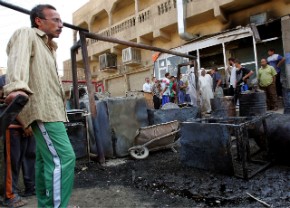Back in Iraq

In authorizing military air strikes in Iraq—he is the fourth U.S. president in a row to do so—President Obama insisted that he was using military force for a limited, “humanitarian” reason and was not dragging the country into another war in Iraq. The strikes were designed, he said, to prevent the imminent genocide of an ancient religious sect known as the Yazidis, protect Christians who were fleeing from Islamic State fighters, and defend American personnel on the ground.
Those are worthy goals, and the emergency situation offered no other practical options for realizing them. The inherent danger of the action, however, is that it is tied to a much broader—and seemingly open-ended—strategy: to protect the oil-rich regions held by the Kurdish people of northern Iraq and push back against the forces of the Islamic State of Iraq and Syria. “We are not going to let [ISIS] create a caliphate through Syria and Iraq,” the president told an interviewer. If that goal governs the use of air power, then the strikes will not be limited to humanitarian aims.
Read our latest issue or browse back issues.
With some members of Congress calling for a more aggressive battle against ISIS, Obama needs to be very clear about the limits of this intervention. He earlier promised that the United States would not become “the Iraqi air force”—yet it has now taken on the role of the Kurdish air force. What does that lead to?
By intervening on the side of the Kurds against the Sunni radicals of ISIS, the United States reenters the sectarian fray in Iraq, bolstering the Kurds’ hopes of gaining their own independent state. This move is at cross purposes with the United States’ other stated goal of creating a unified Iraqi government that comprises Kurds, Sunni, Shi‘a, and other religious and ethnic groups.
That contradiction reveals some of the dilemmas of any intervention in Iraq. The Iraqi government on which the United States has pinned its hopes may well fall apart. The enmity between Kurds, Sunnis, and Shi‘a has only grown deeper in recent years, and each group is internally divided by politics and personalities. The notion that the United States can shape its desired political outcome by air power (or ground troops) is misguided.
A redrawing of borders appears to be occurring in the Middle East. The lines drawn by European leaders in the aftermath of World War I are fading. The rise of ISIS, and the prospect of a brutal Islamic state—where terrorism is encouraged, minority groups are killed, and women are stoned to death for adultery—is of course alarming. But it is alarming also to the major powers in the region—Turkey, Russia, Saudi Arabia, and especially Iran. After more than a decade of largely destructive interventions in Iraq, the United States should work with those countries to contain ISIS. And rather than consider more military involvement, the United States should adopt a modest goal in Iraq: do no harm.





